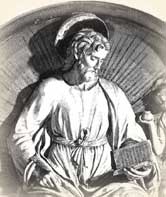
Little enough is known of any of the apostles. Of Paul, Peter, and John we have the most detail. Regarding those apostles who bring up at the tail of the apostolic lists, we have the least. Matthew is somewhere between.
His name was originally Levi. We know that Matthew and Levi are one and the same person because the gospels of Matthew and Luke record a feast at which Jesus was criticized for association with publicans: Luke attributes this banquet to Levi; The Gospel of Matthew attributes it to Matthew.
In his gospel (if it is his), Matthew tells that Christ approached him as he collected taxes and said, "Follow me." Immediately he arose and followed. Perhaps he had had one too many arguments that day. Perhaps he had been cursed by an irate taxpayer one name too many. Since he worked a booth near Capurnaum, he had, no doubt, heard of Christ. For all we know, Matthew may have been one of the tax collectors converted by John. Although tax collectors were generally hated by the Jews as rapacious instruments of the oppressive Romans, nothing says Matthew was dishonest. Tax collectors came to John the Baptist and asked what they should do. "Collect no more than is owed you," replied John.
At any rate Matthew rose immediately and followed Jesus, leaving his past behind. His humility is everywhere shown by his allusion to himself. "Matthew, the publican," he calls himself, branding himself with the profession the Jews most hated.
His original name, Levi, suggests that he was a man of the priestly tribe. When he wrote his gospel, after years of exposure to the teachings of Christ and days of fierce persecution, he was the only one of the four who directly addressed the Jews. Matthew showed deep interest in the priestly and scribal functions of his class. His gospel more than any other focuses on law and the fulfillment of scriptures and on genealogy and detail which reflects his Jewish background. Christ's fierce denunciations of the Pharisees and his prophecies of the end of the temple are most fully recorded in the writing of this apostle.
Matthew's interest in money finds expression, too. The parable of the talents is found only in his account along with many other beautiful passages of great richness. Herbert Lockyer notes that Matthew uses more words for money than any other gospel writer.
Matthew was well-to-do. As soon as he came to Christ he threw a party and invited others of his unsavory profession. He wanted to share Christ with them. No doubt similar concerns motivated him when he wrote his gospel in an attempt to share Christ with the whole Jewish race. We have nothing but legend about Matthew's death. His feast in the Roman Catholic Church is on this day, September 21.
Bibliography
- Bell, Mrs. Arthur. Saints in Christian Art. London: George Bell, 1901 - 1904.
- Butler, Alban. Lives of the Saints. Westminster, Maryland: Christian Classics, 1981, 1956.
- Jacquier, E. "St. Matthew." Catholic Encyclopedia. New York: Appleton, 1914.
- Lockyer, Herbert. All the Apostles of the Bible. Grand Rapids, Michigan: Zondervan, 1972.
- McBirnie, William Steuart. The Search for the Twelve Apostles. Wheaton, Ill.: Tyndale House, 1973.
- Vigeveno, H. S. Thirteen Men Who Changed the World. Glendale, California: Regal, 1966.